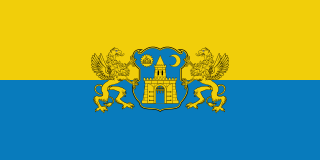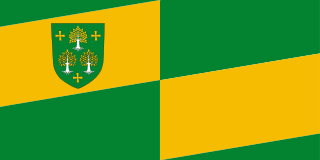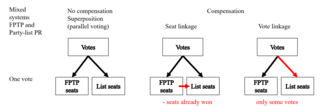Elections in Hungary are held at two levels: general elections to elect the members of the National Assembly and local elections to elect local authorities. European Parliament elections are also held every 5 years.

Parliamentary elections were held in Hungary on 9 April 2006, with a second round of voting in 110 of the 176 single-member constituencies on 23 April. The Hungarian Socialist Party (MSZP) emerged as the largest party in the National Assembly with 186 of the 386 seats, and continued the coalition government with the Alliance of Free Democrats (SZDSZ). It marked the first time a government had been re-elected since the end of Communist rule. To date, this is the most recent national election in Hungary not won by Fidesz-KDNP, and the last in which the victorious party did not win a two-thirds supermajority in parliament.

Dunakeszi is a city in Pest County, Budapest metropolitan area, Hungary. It is located to the north of Budapest on the left bank of the Danube.
Block plurality voting is a winner-take-all method for multi-winner elections. Each voter may cast as many votes as the number of seats to be filled. The usual result when the candidates divide into parties is that the most popular party in the district sees its full slate of candidates elected.

LMP – Hungary's Green Party is a green-liberal political party in Hungary. Founded in 2009, it was one of four parties to win seats in the National Assembly in the 2010 parliamentary election. It is a member of the Global Greens, and suspended member of the European Green Party.
Local elections took place in Hungary on 1 October 2006 amidst a period of protests and demonstrations against the government of Prime Minister Ferenc Gyurcsány. In many cities, demonstrators urged people not to vote for the MSZP candidate at the elections, and Fidesz made heavy use of the fact that Gyurcsány had admitted lying in its campaign leaflets and phone calls.

The General Assembly of Budapest is a unicameral body consisting of 33 members, which consist of the 23 mayors of the districts, 9 from the electoral lists of political parties, and the Mayor of Budapest. Each term for the mayor and assembly members lasts five years.

District V is the heart of Budapest and the political, financial, commercial and touristic center of Hungary. The name of the district is Belváros-Lipótváros, which refers to the two historical neighbourhoods that is located in the district; Belváros and Lipótváros . Inner City is the old town of Pest, while Leopold Town was established in the early 19th century, and became the political and financial centre of Hungary in the early 20th century when the Hungarian Parliament was built. The two neighbourhoods were originally the 4th and 5th districts of Budapest until 1950 when the two districts were merged and number IV was given to Újpest.

The 1st District of Budapest is the Castle District and is the historical part of the Buda side of Budapest. It consists of the Buda Castle Hill and some other neighborhoods around it, like Tabán, Krisztinaváros and parts of Gellért Hill.

Terézváros is the District VI of Budapest, and was named after Queen Maria Theresa in 1777, who visited the neighbourhood 26 years earlier in 1751. The territory was first inhabited in the early 18th century when the old town of Pest was already fully built, so that people had to inhabit lands outside the city. Terézváros was one of the ten districts that were formed when the city of Budapest was created in 1873.
Today Terézváros is the second in population density after the neighbouring Erzsébetváros. Terézváros is meanwhile the second smallest district. Both districts are famous for their night life.

Óbuda-Békásmegyer is the 3rd district of Budapest, Hungary.

The 2nd district of Budapest is a district of Budapest, Hungary. It has an area of 36.34 km2 and is situated to the south of the 3rd district and to the north of the 1st district and the 12th district.

The Mayor of Budapest is the head of the General Assembly in Budapest, Hungary, elected directly for 5-year term since 2014. Until 1994 the mayor was elected by the General Assembly. The office was called Chairman of the Council of Budapest between 1950 and 1990, during the Communist period.
Local elections were held in Hungary on 13 October 2019. Mayors and assembly members were elected for a term of 5 years.

The 2014 Budapest Assembly election was held on 12 October 2014, concurring with other local elections in Hungary. Voters elected the Mayor of Budapest, and the mayors of the 23 districts directly, while 9 seats in the assembly were distributed proportionally, taking into account votes cast for losing district mayoral candidates. This was the first election held under these rules, previously all seats were elected with a party-list method.

László Kiss is a Hungarian teacher and politician, who has been the mayor of Óbuda-Békásmegyer since 2019. He was also a member of the National Assembly (MP) for the district from 2014 to 2018.

A mixed single vote (MSV) is a type of ballot in mixed-member electoral systems, where voters cast a single vote in an election, which used both for electing a local candidate and as a vote for a party affiliated with that candidate according to the rules of the electoral system. Unlike most mixed proportional and mixed majoritarian systems where voters cast two votes, split-ticket voting is not possible under MSV. This significantly reduces the possibility of manipulating compensatory mixed systems, at the price of reducing voter choice. An alternative based on the mixed single vote that still allows for indicating different preferences on different levels is the mixed ballot, which functions as a preferential (mixed) single vote.

The electoral system of Hungary is the set of voting methods and rules used in Hungary, including mainly the system for electing members of the National Assembly : and local government elections. The Hungarian electoral system also includes the systems used for the European Parliament elections held in Hungary and the elections of minority local government elections, as well as the rules of referendums and similar initiatives. The president of the republic is not directly elected.
The 2024 Hungarian local elections were held on 9 June 2024. Mayors across the country were elected.

The 2024 Budapest Assembly election was held on 9 June 2024, concurrent with other local elections in Hungary. In December 2023, the Hungarian Parliament restored party-list proportional rules, which was last applied in the 2010 Budapest Assembly election. During the election, 32 representatives will be elected, while the Mayor of Budapest will be elected directly by popular vote at the same time.
















